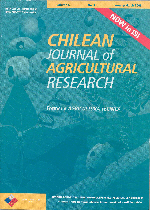
|
Agricultura Técnica
Instituto de Investigaciones Agropecuarias, INIA
ISSN: 0365-2807
EISSN: 0365-2807
Vol. 65, No. 3, 2005, pp. 312-318
|
 Bioline Code: at05034
Bioline Code: at05034
Full paper language: Spanish
Document type: Note
Document available free of charge
|
|
|
Agricultura Técnica, Vol. 65, No. 3, 2005, pp. 312-318
| es |
Efecto de herbicidas aplicados durante la madurez del grano de trigo en el rendimiento y calidad del grano
Mellado, Mario Z. & Pedreros, Alberto L.
Resumen
Se realizaron siete ensayos en trigo harinero ( Triticum aestivum

L.), cultivar de primavera Domo-INIA, durante las temporadas 2001-2002 y 2002-2003, para evaluar el efecto de diversos herbicidas aplicados durante la madurez del grano de trigo sobre el rendimiento y calidad del grano. Se usó un diseño de bloques completos al azar con cinco tratamientos y cuatro repeticiones. La diferencia entre los ensayos fue el estado de madurez del trigo al momento de aplicar los herbicidas. Los herbicidas usados fueron: 2,4-D, glifosato, glifosato+MCPA, y paraquat, además, se incluyó un tratamiento testigo sin herbicida. Los parámetros evaluados fueron: rendimiento de grano, peso del hectolitro, peso de 1.000 granos, porcentaje de germinación, índice de sedimentación y glúten húmedo. Los ensayos se ubicaron en un suelo Andisol del Campo Experimental Santa Rosa (36°31' lat. Sur, 71°54'long. Oeste), perteneciente al Instituto de Investigaciones Agropecuarias (INIA), en el Centro Regional de Investigación Quilamapu, Chillán, Chile. Los resultados indicaron que el 2,4-D puede ser aplicado a una sementera en estado de grano lechoso; además, los efectos obtenidos en un año indicaron que el 2,4-D podría ser aplicado cuando el grano tiene consistencia acuosa. Desde el estado de grano semiduro en adelante, cualquiera de los herbicidas usados en estos experimentos se puede aplicar sin afectar el rendimiento de grano y su germinación, así como peso del hectolitro, el índice de sedimentación y el contenido de glúten.
Triticum aestivum, herbicidas de precosecha, trigo.
|
| |
| en |
Effect of herbicides applied during grain ripening on quality and yield of wheat
Mellado, Mario Z. & Pedreros, Alberto L.
Abstract
Seven trials with spring bread wheat (Triticum aestivum L.) cultivar Domo-INIA were carried out during the 2001-2002 and 2002-2003 seasons, to evaluate the effect of diverse herbicides applied during grain ripening on yield and grain quality. A randomized complete block design with five treatments and four replications was used. The difference in the trials was the stage of maturity at the moment the herbicides were sprayed. The used herbicides were: 2,4-D, glyphosate, glyphosate + MCPA, and paraquat, plus a control treatment without herbicide. The evaluated parameters were: grain yield, hectoliter weight, 1000 grain weight, seed germination (%), sedimentation index and wet gluten. The experiments were located in an Andisoil soil at the Santa Rosa Experimental Station (36°31' S lat; 71°54' W long), Quilamapu Research Center, Chillán, Chile belonging to the National Agriculture Research Institute. The results indicated that the herbicide 2,4-D can be applied when grains have a milky consistency, as well, results obtained in one season indicated that 2,4-D also could be applied when the grain has a watery consistency. From the stage of semihard grain and on, any of the herbicides used in these trials can be applied , without affecting grain yield and germination, as well as hectoliter weight, sedimentation value and gluten content.
Keywords
Triticum aestivum, pre-harvest herbicides, wheat.
|
| |
© Copyright 2005 - Instituto de Investigaciones Agropecuarias, INIA (Chile)
Alternative site location: http://www.inia.cl/at/agritec.htm
|
|
